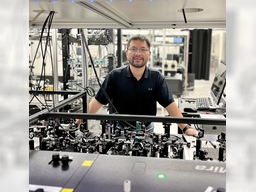Colloquium: Dr. Hebin Li | Florida International University
In-Person PHYS 401
Location
Physics : 401
Date & Time
February 26, 2024, 11:00 am – 12:00 pm
Description
TITLE: "Exploring Many-Body Physics with Single Quantum Entities for Quantum Information Science”
ABSTRACT: Future scalable and reliable universal quantum computers can be more superior than classical computers for solving certain problems. To fully harness the power of quantum mechanics, the quantum computing platform must be a many-body system with interacting or coupled quantum entities (qubits). For example, entangling multiple qubits requires coupling and coherence. The behavior of an assemble of interacting particles cannot be understood by a simple extrapolation of the microscopic lawas of single particles. Instead, entirely new properties can appear at each level of complexity, as pointed out by P.W. Anderson in 1972. Experimentally understanding new principles and laws in many-body systems is essential for both fundamental many-body physics and ultimately providing practical solutions for future scalable and reliable quantum computers.
ABSTRACT: Future scalable and reliable universal quantum computers can be more superior than classical computers for solving certain problems. To fully harness the power of quantum mechanics, the quantum computing platform must be a many-body system with interacting or coupled quantum entities (qubits). For example, entangling multiple qubits requires coupling and coherence. The behavior of an assemble of interacting particles cannot be understood by a simple extrapolation of the microscopic lawas of single particles. Instead, entirely new properties can appear at each level of complexity, as pointed out by P.W. Anderson in 1972. Experimentally understanding new principles and laws in many-body systems is essential for both fundamental many-body physics and ultimately providing practical solutions for future scalable and reliable quantum computers.
In this talk, I will start with a brief background introduction of quantum information science and then present our work in exploring many-body systems that consist of single quantum entities including single atoms and solid-state-based atom-like entities. Recent advances in the preparation of these exotic singe quantum entities and in coherent spectroscopy provide
unprecedented opportutnties. We can deterministically prepare a few- or many-body quantum system of single quantum entities using a bottom-up approach and use ultrafast coherent spectroscopy to study many-body properties in these systems. For example, our results revealed long-range dipole-dipole interaction between atoms with separation up to tens of micrometers. We have also observed multi-atom Dicke states with a scalable and deterministic number of atoms from two to eight atoms, providing the prerequisite for generating entangled states of up to eight atoms. The study of these systems contributes to fundamental understanding of many-body
physics as well as potential applications in quantum information science.
